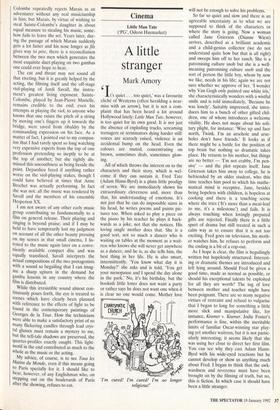Cinema
Little Man Tate ('PG', Odeon Haymarket)
A little stranger
Mark Amory
It's quiet ... too quiet,' was a favourite cliché of Westerns (often heralding a near- miss with an arrow), but it is not a com- plaint that has been heard a lot around Hollywood lately: Little Man Tate, however, is too quiet for its own good. It is not just the absence of exploding trucks, screaming teenagers or terminators dying harder still: voices are scarcely raised, violence is an accidental bump on the head. Even the colours are muted, concentrating on brown, sometimes drab, sometimes glow- ing.
All of which throws the interest on to the characters and their story, which is wel- come if they can sustain it. Fred Tate (Adam Hann-Byrd) is a plain little prodigy of seven. We are immediately shown his extraordinary cleverness and, more than that, his understanding of emotions. It's not just that he can do impossible sums in his head, he writes poems and paints pic- tures too. When asked to play a piece on the piano by his teacher he plays it back- wards as a joke, not that she notices. His loving single mother does that. She is a good sort, not so much a dancer who is waiting on tables at the moment as a wait- ress who knows she will never get anywhere as a dancer, and he is, as she tells him, the best thing in her life. He is also smart, intermittently. 'You know what day it is Monday?' she asks and is told, 'You get your menopause and I spend the day alone in the park.' No, it's his birthday, but the bookish little loner does not want a party or rather says he does not want one when it is clear no one would come. Mother love
'I'm cured! I'm cured! I'm no longer religious!' will not be enough to solve his problems.
So far so quiet and slow and there is an agreeable uncertainty as to what we are supposed to think of the characters or where the story is going. Now a woman called Jane Grierson (Dianne Wiest) arrives, described as a brilliant academic and a child-genius collector (we do not understand quite how but that is all right) and sweeps him off to her ranch. She is a patronising culture snob but she is a well- meaning patronising culture snob and the sort of person the little boy, whom by now we like, needs in his life; again we are not sure whether we approve of her. 'I wonder why Van Gogh only painted one white iris,' she characteristically wonders with a wistful smile and is told immediately, 'Because he was lonely'. Suitably impressed, she intro- duces him to a bunch of other gifted chil- dren, one of whom introduces a welcome vitality. He does not mope about his soli- tary plight, for instance: 'Wise up and face north, Twink. I'm an arsehole and arse- holes don't have friends.' It looks as if there might be a battle for the position of top brain but nothing so dramatic takes place. He returns to his mother, but things are no better — 'I'm not crabby, I'm pen- sive' — and the plot repeats itself. Jane Grierson takes him away to college, he is befriended by an older student, who this time teaches him pool to which his mathe- matical mind is receptive. Jane, besides being hopeless with children, is hopeless at cooking and there is a touching scene where she tries ('It's more than a meat-loaf to me, it's a milestone') and fails. It is always touching when lovingly prepared gifts are rejected. Finally there is a little spurt of drama but still treated in such a calm way as to ensure that it is not too exciting. Fred goes on television, his moth- er watches him, he refuses to perform and the ending is a bit of a cop-out.
As I hope is clear, the film is beguilingly written but hopelessly structured. Interest- ing or dramatic themes are introduced and left lying around. Should Fred be given a good time, made as normal as possible, or should his exceptional talents be exploited for all they are worth? The tug of love between mother and teacher might have been poignant. There are so many negative virtues of restraint and refusal to vulgarise that I began to long for something a little more slick and manipulative like, for instance, Kramer v. Kramer. Jodie Foster's performance is fine, within the inevitable limits of familiar Oscar-winning star play- ing yet another waitress, but it is not partic-
ularly interesting; it seems likely that she was using .her clout to direct her first film.
You can see why they cast Adam Hann- Byrd with his wide-eyed reactions but he cannot develop or show us anything much about Fred. I began to think that the awk- wardness and reverence must have been brought on by the filming of truth, but no, this is fiction. In which case it should have been a little stranger.


















































 Previous page
Previous page